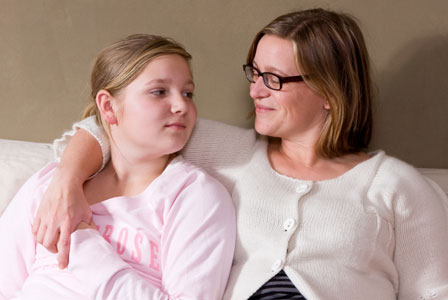
Before your teen returns to school in the fall, sit down for a serious talk about drug abuse.
D is for drugs
Learn how to do your research ahead of time, how to become a resource for your child, and how to dive into a conversation that will probably make both of you uncomfortable. This is a talk you can’t afford to skip.
Whether your child is entering seventh grade or beginning her senior year, you need to have a talk about drugs. Helping to keep your teen off drugs is an investment in the present time and in her future. According to the National Health Information Center, kids who don’t do drugs are less likely to struggle in school, get injured in a car accident, become a victim of crime or experience addiction as an adult.
Be real and blunt
Don’t talk about drugs as something that may or may not ever factor into your teen’s life. The hard truth is, your child likely already knows kids who use drugs and alcohol. Drugs are easy for teens to obtain. Some kids are doing drugs as early as middle school. Make it clear to your teen that you’re aware that drugs are present in his life. When you don’t seem clueless, your child is more likely to embrace having a serious conversation with you. Avoid trying to sound like a cool, nonchalant parent. You need to be firm, honest and open to what your teen is ready to tell you about his exposures to drugs and alcohol.
Discover how to help teens adjust to a new school >>
Use tools to help with the conversation
Come into the conversation with facts on hand. Don’t let your child assume that you’re making things up to scare him. Download information from Drug Facts Week, such as this pamphlet on busting drug myths. It’s written specifically for teens and it’s backed by research and hard data. Be brutally honest when it comes to consequences, but remember that brutally honest doesn’t mean scare tactics. Your teen is more likely to tune you out if you sound like you’re exaggerating. Instead, be honest about risks of drugs, including the ones your teen may not have considered, such as increased risk of sexual assault.
Be aware of messages
Your child has access to a variety of messages about drugs. From young celebrities who have entered substance abuse programs to fictional characters on TV, people in your child’s life are normalizing drug use. You don’t need to raid your child’s iPod, but you should be aware of his interests and what kinds of messages he’s receiving, whether it’s an R-rated stoner comedy or a song about smoking pot. Just like commercials on TV, these messages have an impact on what your teen finds acceptable or desirable.
Learn how to boost your teen girl's self-confidence >>
Set an example of how you want your teen to live
Be smart about the example you set for your teen. Avoid reckless behavior around your child. Don’t underestimate how observant your teen is. If you smoke, consider quitting. If you drink, don’t over-indulge. Never drink and drive. Never share or abuse your prescription drugs. Your child will model his behavior from yours. As an adult, it can be difficult to admit that your behavior isn’t an ideal example. If you have a substance abuse problem, seek help. Talk to your child about your own experiences with drugs and alcohol.
More on parenting teens
Help your teen get the most out of school
When a teen's friend moves
Should you encourage your teenager to go to art school?